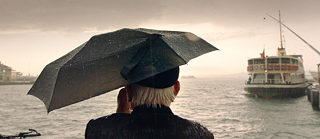Movie review | Berlinale Bloggers
"Faruk": a touching father-daughter story

"Faruk" is a German, French and Turkish film about the life of a 90-year-old man, Faruk, during the demolition of his appartment block in Istanbul. His daughter comes to document his experience through a fictional biography in which Faruk becomes the protagonist of her story.
By Éliane Doré
The film, directed and scripted by Asli Özge, is a committed work that paints a portrait of Istanbul, like her choral film Men on the Bridge (2009), which also performed well at festivals.
An intelligent blend of fiction and documentary
Throughout the film, we constantly wonder whether we're watching a fictional world or not, because the story is something that can happen to anyone. Not to mention the fact that a housing crisis is rife throughout the West, not least here in Montreal. The film is thus anchored in the present. However, as the story progresses, we hear the cuts and the director giving her father instructions on how to act and do the scenes, breaking the fourth wall. The personal aspect of Faruk becomes clearer when the director's name is mentioned in the film, and we realise that it is her own father who is playing the lead role. We realise that in this seemingly fictional story we have access to something raw, the relationship between a daughter and her father, which makes the work really touching.A powerful blend of the intimate and the collective
The film was shot over seven years, so you can really see the evolution of Istanbul under the impact of gentrification, a phenomenon that is widespread everywhere today. We see the destruction of both new and damaged buildings and how this trend has turned many lives upside down. The director wanted to pay tribute to all the people who have lived through these evictions. The documentary aspect lends a great deal of credibility to the story. In some shots, we can see technicians and film equipment such as poles and the clapperboard that marks the start of filming. She has also given the lead role to her father, which gives her project a very intimate feel. The film shows both her personal life and the more social and committed aspect of the strained relations with the building's owners. The shots show us the difficulties of being an elderly man who has had his home taken away from him and moved to a place that doesn't suit him.The strength of the film lies in this mix of forms, because while there are many documentaries on the subject, it is the empathy we feel for Faruk thanks to the mechanisms of fiction that makes us think most about the victims of this housing crisis. Faruk is a must-see!